- Home
- Catherine Bateson
Lisette's Paris Notebook Page 12
Lisette's Paris Notebook Read online
Page 12
‘Take cash only,’ she said, ‘you will not be able to use a card. Be careful in the metro – it is not a good line. There will be thieves.’
Porte de Vanves reminded me of parts of Melbourne – it was more modern than the Paris I had become used to. There were no sweet alleys and old buildings but tall modern apartments and office blocks, and there was a tram. I stood there gaping at it. A tram! I took a photo to send to Ami.
The market stretched up one street to a coffee cart, then it turned the corner, meandered along that street and across the road was another length of stalls. It was just after ten when Napoléon and I arrived and the market was bustling. There were all sorts of vintage things for sale. The first stall had ugly vases, empty picture frames, and a plastic tray full of costume jewellery. The next had linen: embroidered tablecloths, napkins and rolls of faded ribbon. Another stall sold nothing but perfume bottles and the Chanel and Bulgari gifts that you sometimes got if you spent enough money, blingy bracelets and necklaces, a wallet and a travelling jewellery pouch. They weren’t free on the stall, of course. Other stalls sold doll’s heads. They seemed sad, piled up without their bodies. Then I overheard the price of one and sadness was replaced by incredulity.
I could see so many things that Mum would love. Madame Christophe had been right – this was the place to buy her a French present. Perhaps an Art Deco tea set? She would adore that but of course it was entirely impractical. I needed something precious but small. There was a stall of handbags and one of them was vintage straw decorated with bright yellow daisies that I knew would have matched the yellow in my cowboy dress. I picked it up twice, to the stallholder’s displeasure. She hissed the price at me and I replaced the handbag reluctantly. I hadn’t bargained on the market being so full of wonderful things and my cash was limited. Mum’s present would have to come first.
I was nearly back down the row when I saw it – a marcasite brooch. A poodle. It was half kitsch, half gorgeous and fully vintage. It was wholly perfect. I asked the stallholder how much it was.
She eyed me up and down. ‘It’s marcasite,’ she said, ‘and it’s very old.’
I knew it wasn’t that old, but I just nodded. ‘It is the ideal thing for my mother,’ I said.
‘It is one hundred and twenty euros,’ the woman said, smiling and reaching for the brooch. ‘Shall I wrap it for you?’ ‘That’s too expensive,’ a familiar voice behind me said. ‘Chérie, it’s a little gaudy, don’t you think?’ Hugo plucked the brooch from my hand and turned it over. ‘I mean, it’s cute, if you like this kind of thing.’ He shrugged and returned it to the stallholder. ‘But too expensive, regrettably.’ He pulled me away.
‘I wanted that,’ I hissed as he marched me from the stall.
‘I know you did and so did she. It was all over your face. You need to bargain, Lise. It’s only fifties marcasite. Although it is sterling, I’d give you that, and the poodle is very French. It’s a perfect gift for your mum.’
‘But you stopped me from getting it!’
‘Ah, no, but I have a plan. A cunning plan.’ He was leading me back up the hill to the coffee cart.
‘I knew it was fifties, by the way,’ I told him, ‘and I guessed it was silver. I’m not stupid.’
‘I don’t think you’re stupid at all.’ Hugo stopped and the crowd of shoppers swirled around us. ‘I think you’re sharp, Lise. You’re clever, stylish, brave, quite beautiful and I bet you wouldn’t say no to a hot chip?’
His abrupt change of subject was disconcerting. ‘Well, thanks. I mean for the compliments. And, yes, I guess to the chips. But I want that brooch, Hugo. What if someone else gets it?’
‘Then you shrug philosophically and say, ah well, there is always another market, another brooch.’
‘You said yourself it was perfect and you don’t even know Mum.’
‘Okay, okay. Just wait. Let’s order chips and while they cook I’ll get your brooch. Deal?’
He ordered the chips and I sat down at a rickety table with Napoléon at my feet, growling slightly at a feisty miniature schnauzer who was guarding the end of a bread roll.
‘I’ll be back,’ Hugo said. ‘Make sure the Hound of the Baskervilles doesn’t eat all the chips!’
The proprietor came over with our food. ‘Hugo’s a good man.’
I was intrigued. ‘You know him?’
The guy nodded. ‘Always joking, even though life cannot be easy. His uncle is troubled.’
‘Yes, I’ve heard.’
‘But of course, the company of a young woman as lovely as yourself will make him cheerful.’
‘We haven’t known each other for very long,’ I said hastily.
‘Ah well, there is always the beginning,’ he said cryptically and shuffled back to serve someone else.
‘Voilà,’ Hugo said, coming up behind me, ‘your brooch! You owe me the rather less expensive sum of seventy euros.’ ‘Oh, Hugo – that’s wonderful. How did you do that?’
‘Charm and wit. I could have got it for less had you not so obviously wanted it.’
I unwrapped the brooch. ‘How did you know it was silver?’ I asked, turning it over as Hugo had done.
‘See that?’ Hugo pointed to a tiny imprint. ‘That’s the silver hallmark. You can absolutely guarantee anything with that mark is silver. I say, it is lucky we’ve met again, isn’t it? This is our third meeting. That has to mean something.’
‘It means that Paris is quite small,’ I said.
‘No, anything that comes in threes is symbolic. That’s a rule of the universe. So, what else catches your fancy?’
‘There’s a handbag,’ I said slowly, ‘but it would be hard to pack. It’s straw.’
‘You’re thinking of packing already?’
I rolled my eyes. ‘Only in terms of shopping.’ Actually, when I added up how many weeks I had left, I was dismayed. I would be leaving Paris in seven weeks. Seven weeks! Time was slipping past. I’d already been in Paris for more than a month.
‘Yellow daisies?’
‘Yes, that’s it. How did you know?’
‘We antique dealers know these things.’ Hugo laid a finger beside his nose and nodded complacently. ‘Come on, let’s get you bargaining, Lise. The trick is to pretend to yourself as well as the stallholder that you don’t care if you get the object of your desire or not. Just tell yourself there’s something even more perfect around the corner. If that fails, pretend to be someone else – haughty and supercilious.’
We went back to the stall and Hugo launched into a stream of effortless French. Within seconds the stallholder had unbent and they were laughing at each other’s jokes. I was pleased with how much I understood. Hugo had made me his girlfriend. He was against the buying of the bag, because it would be difficult to pack.
‘But Hugo,’ I said, placing both my hands on his shoulders and looking up at him in a girlfriendly way, ‘I will carry it. It’s a handbag!’ The stallholder and I rolled our eyes at men in general, and this one in particular. His shoulders were bony under my hands. What would it be like to slide my hands down his back? I’d be able to feel every little knot of his spine. Instead I put my fingers on his mouth. ‘Don’t say another word,’ I said. I rather hoped he’d kiss my fingers but instead he took my hand in his and held it.
Then it was over to me.
The stallholder named a ridiculous sum. I picked the bag up. I pretended to myself that I didn’t really want it. I’d much rather a Birkin, I thought. I looked at it critically and picked at a loose bit of straw with a contemptuous fingernail. I examined the underside of one of the yellow daisies (so perfect!) and showed Hugo a discoloured spot on the fabric. We both shook our heads. I tested the handle and poked at one end that was slightly unravelling. Nothing I couldn’t fix. I could already see exactly how it could be done with some stout linen thread.
‘Regrettably, Madame,’ I said, ‘this bag is not in perfect condition. Look.’ I flicked my fingernail at the loose straw and tugged on the handle, d
rawing her attention to the flaws.
She shrugged and lowered the price by five euros. I was a haughty Birkin-loving woman. I was enjoying myself. I eyed the bag speculatively. ‘Packing it will be a problem,’ I said, ‘and not just for me, but for anyone. Only a tourist, after all, would be interested in such a piece.’
‘Oh, but not at all, Mademoiselle,’ the vendor said, ‘these are very desirable this season. Have you seen the latest Vogue?’
‘I have, Madame,’ I said – and I wasn’t fibbing. I’d pored over it only a couple of nights ago, seeing if I could understand all the articles, but mainly examining the clothes. ‘There was not a single piece like this, I’m afraid. This season it’s all about neutral leathers and everything is oversized. We are carrying our life in our handbags. This is why you will only sell this to a tourist.’
‘It is vintage,’ the vendor said defensively, ‘vintage is always au courant.’ But she lowered the price by another five euros.
I managed to bargain her down by fifteen euros without Hugo saying a word.
‘Your girlfriend is formidable,’ the stallholder said grudgingly as she handed over the bag.
Hugo laughed. ‘She surprises me all the time,’ he said and then drew me into a hug. Without thinking I stood on my tiptoes and kissed his mouth. It was a soft kiss that I let last longer than I should have because the surrounding stallholders and several passers-by clapped.
‘You do surprise me,’ Hugo whispered.
‘Oh, that’s right – you’re English. That was a little too public for you?’ I wanted to kiss him again and keep my eyes open this time. I wanted to see if he enjoyed it.
‘Not at all. We’ve met three times. We’d probably have a kid by now, back where I was born.’ Hugo grinned. ‘I’ll carry the bag for you. You’ve got Napoléon. You did really well, you know. I wouldn’t have believed that was your first time haggling. You’re a natural.’
‘It was fun,’ I said. ‘I really, really enjoyed it. But then handbags are something I know about. Jewellery, not so much.’ Hugo still held my hand. Kissing him had been an unexpected bonus. But I didn’t say that out loud.
‘It can all be learnt,’ Hugo said, ‘if you’ve got a feel for it and an eye – which obviously you do. I bet I could sell that brooch for twice what you paid for it. It’s very quirkily chic.’
For a breathless moment I imagined the market life for myself, or maybe running a small shop. ‘Oh Madame,’ I’d say, ‘such an elegant piece but with a genuine French je ne sais quoi.’
‘Can we have lunch together?’ Hugo interrupted my daydreaming.
‘We’ve just eaten,’ I said.
‘Chips were the entree. Come on, there’s a place near the metro. Cheap and cheerful. I want to know everything about you, Lise.’
He dropped my hand and then offered me his elbow. I tucked my hand in its crook and we sauntered off. Hugo didn’t seem to be at all concerned that in his other hand, he swung a vintage straw bag covered in yellow leather daisies and sporting an enamel daisy clasp.
The Romany girls I’ve seen in Paris have been dressed just as I’d imagined – flounced skirts, jangling bracelets and off-the-shoulder tops. Their eyes slide past me. I cannot imagine living as they do, so brashly identifiable and so obvious.
If you had asked me, I would have said that Hugo did most of the talking. He told me the local gossip in the town he and his uncle lived in. He told me about his uncle’s dogs and how they were his uncle’s excuse for not going anywhere, except for walks on the common. He talked about ordinary things, like the television programs he and his uncle watched and how his uncle had taught him to cook. In return I told him about my mother’s afternoon teas with the rose-patterned Royal Doulton teacups, the sugar tongs and the teapot always turned three times.
‘We have tea bags,’ he said. ‘Fancy being out-civilised by an Aussie colonial!’
‘Mum doesn’t like that the tea has to be bagged,’ I said. ‘It’s environmentally unsound.’
‘She’s smart, your mum.’
‘Sometimes,’ I admitted, ‘but she lives – well, Ami calls our place the House of Estrogen. That says it all, doesn’t it?’
‘That could be scary,’ Hugo said.
‘It’s a bit like a movie set,’ I said. ‘Designated places untidy, otherwise cushions plumped, throw rugs on the furniture they exactly match, flowers always in the correct vase and candles at night.’
‘Comforting, then? Unc and me – it’s dishes in tottering piles on the sink, herds of empty beer bottles standing around and a month’s worth of old newspapers in lieu of a tablecloth.’
‘Disgusting’ – I wrinkled my nose – ‘but kind of fun.’
‘That’s behind the shop doors, of course. In the shop it’s different. Sherry for the best customers. Old crystal glasses that Unc surreptitiously polishes on his shirttails. The English don’t mind. Used to eccentricity. We embrace it.’
‘Australians don’t,’ I said. ‘We like everyone to conform and to be good at sport.’
‘But you don’t look like a joiner. Are you good at sport?’
‘I play tennis. At school that wasn’t good enough. It was all about netball or swimming. There were the popular kids, the sports jocks and the nerds. Then there was me and my best friend. We were a little hard to categorise.’
‘Who likes school anyway?’ Hugo said. ‘Dreadful idea. Unc thinks we should all have had tutors at home. The old way.’
‘In the library?’ I imagined a dark room, floor-to-ceiling books and children standing around a large desk that was covered, perhaps, in a map.
‘Oh my God, the library!’ Hugo pulled out his phone. ‘I have an appointment. Phew – there’s time.’
‘Do you have to rush off?’
‘The book market. I’m sorry, Lise.’ He rifled through his wallet. ‘I thought I had a card. Damn. Do you have a pen?’
‘Probably.’ I rummaged around in my backpack and found a biro.
‘This is my number.’ Hugo grabbed my forearm and wrote large numbers along my arm. ‘I seriously have to run!’ He dropped a kiss on my forehead and ran off with a strange, loping stride.
I made my way down to the metro wistfully. I’d expected the afternoon to continue with us wandering around together. I’d certainly wanted that to happen! I pushed through the turnstile, Napoléon in my arms, and when the train arrived I jumped on still thinking of Hugo. Napoléon bristled and I saw that I’d nearly stepped into a taut piece of rope at one end of which a thin, watchful dog hunkered down under a seat.
Across the aisle sat a woman dressed in layered rags, so dirty I wasn’t sure of the original colour. Her feet were bare and her matted dreads were wrapped in a filthy scrap of material. Another dog sat under her seat. She and the dogs stared at me. I didn’t want to back away but I didn’t want to step over the rope, either. I wanted to say excuse me, but I couldn’t find my voice. Finally she yanked the rope and the dog slithered reluctantly from under his seat to join her other dog. Napoléon’s hackles rose and he growled but I hushed him and walked past. I whispered, ‘Merci.’
It was the dogs that shocked me. Most of the dogs I’d seen on the street had been well cared for, even pampered. They were drawcards for money, as well as company for their owners. The guy begging next to the supermarket had two Pomeranians he brushed until their fur was supermodel shiny and when he stopped, the dogs nosed and licked him, before curling up on their sleeping mats. These dogs were wild and uneasy. Napoléon was on high alert and I hugged him close. The woman turned deliberately so she could keep staring at me. The other passengers all studiously avoided eye contact with either of us. I counted the stops before mine. There were too many.
Three stops later, she got up. Thank goodness! However, instead of going to the nearest doors, she walked right up to me, pulling the cringing dogs after her. I could smell the thick, unwashed stench of her. She spat a stream of measured invective at me in a language I didn’t understand. With each wo
rd, she brought her face nearer to mine. None of the other passengers moved. I was on my own, apart from Napoleon, who growled. I couldn’t hush him. I couldn’t say a word. My throat was sandpaper.
I was mad, though. At every word, my anger rose. She had no right! I had done nothing. And those poor dogs. They slunk behind her, as far away as their ragged rope leads allowed. I would not cower from her. I returned her stare, found my voice and said, in French, that I didn’t understand her. Finally, the train pulled up and the doors opened. She said one last, long sentence and then jabbed her finger at my forehead, despite Napoléon’s snapping at her, and held it there. Her hand smelled of sweat and dog. I kept staring. Her eyes were full of anger and she could have been any age. It was impossible to tell under the layers of dirt. She may even have been pretty, if she was washed and loved. Just before the doors closed, she pulled herself away and yanked the dogs off the train, but she continued to speak at me through the window until we pulled out of the station. Napoléon bared his teeth.
No one in the train carriage met my eyes. It was as if they hadn’t seen anything.
I was still trembling when I got to Madame Christophe’s.
‘Calm yourself,’ she advised. ‘Poor little Napoléon – he has had a shock?’
‘He’s had a shock! What about me? That horrible woman!’ I told her the whole story.
‘Yes,’ Madame Christophe nodded, ‘yes, I think you have been cursed. No matter. It will be fine. You should wash your forehead. She touches you so that your thoughts are hers, but that cannot be.’
‘I don’t want to be cursed. I don’t even know what she cursed me with. She wasn’t dressed like the other girls.’
‘It will not be pleasant,’ Madame Christophe said calmly, ‘it will be the usual Romany curses – unhappy love, ill fortune for you and yours. They have been cursing people for centuries. Nothing changes. They do not all wear pretty skirts, Lise. There are others, perhaps not so lucky as to own a pretty skirt and some bangles.’

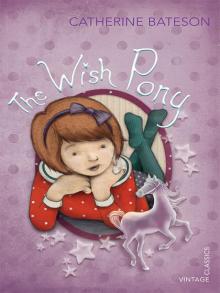 The Wish Pony
The Wish Pony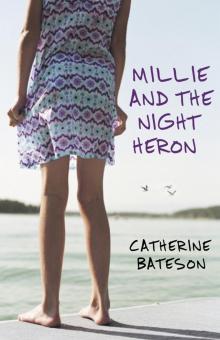 Millie and the Night Heron
Millie and the Night Heron Magenta McPhee
Magenta McPhee Painted Love Letters
Painted Love Letters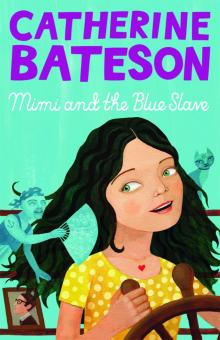 Mimi and the Blue Slave
Mimi and the Blue Slave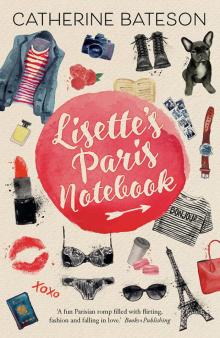 Lisette's Paris Notebook
Lisette's Paris Notebook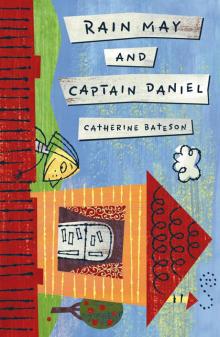 Rain May and Captain Daniel
Rain May and Captain Daniel